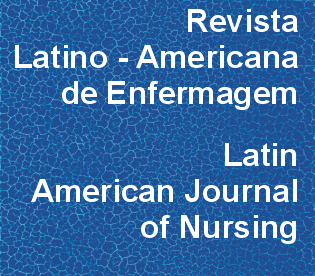Nasal septum injury in preterm infants using nasal prongs
DOI:
https://doi.org/10.1590/0104-1169.3451.2486Abstract
OBJECTIVE: to assess the incidence and risk factors associated with nasal septum injury in premature infants using reused and new nasal prongs. METHOD: the study was a cohort from an open therapeutic intervention. The sample included 70 infants with a gestational age inferior to 37 weeks, who used nasal prongs and were hospitalized at the neonatal service of a hospital in Recife-PE, in the Northeast of Brazil. The data were collected in patient files through the assessment of the application of the device and of the nasal septum. Multinomial Logistic Regression and Survival analyses were applied. RESULTS: the incidence of nasal injury corresponded to 62.9%. In the multiple analysis, only the length of the infant's treatment was a determinant factor for the occurrence and severity of the injuries. CONCLUSION: the type of nasal prong does not serve as a risk factor for the nasal injury. The high incidence of nasal injury indicates the need to adapt the nursing care with emphasis on prevention.Downloads
Download data is not yet available.
Downloads
Published
2014-10-01
Issue
Section
Original Articles
License
RLAE’s authorship concept is based on the substantial contribution by each of the individuals listed as authors, mainly in terms of conceiving and planning the research project, collecting or analyzing and interpreting data, writing and critical review. Indication of authors’ names under the article title is limited to six. If more, authors are listed on the online submission form under Acknowledgements. The possibility of including more than six authors will only be examined on multicenter studies, considering the explanations presented by the authors.Including names of authors whose contribution does not fit into the above criteria cannot be justified. Those names can be included in the Acknowledgements section.
Authors are fully responsible for the concepts disseminated in their manuscripts, which do not necessarily reflect the editors’ and editorial board’s opinion.
How to Cite
Bonfim, S. de F. S. F., Vasconcelos, M. G. L. de, Sousa, N. F. C. de, Silva, D. V. C. da, & Leal, L. P. (2014). Nasal septum injury in preterm infants using nasal prongs . Revista Latino-Americana De Enfermagem, 22(5), 826-833. https://doi.org/10.1590/0104-1169.3451.2486



